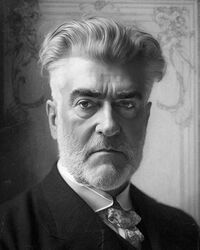Beranism: Difference between revisions
No edit summary |
No edit summary |
||
| Line 13: | Line 13: | ||
| caption2 = Julius Jahoda | | caption2 = Julius Jahoda | ||
}} | }} | ||
'''Beranism''' is an {{wp|ontologically}} {{wp|monistic}} {{wp|moral philosophy}} which serves as the state philosophy of the [[Ostrozava|Prime Republic of Ostrozava]]. It originates from the works of early 20th-century [[Ostrozava|Ostrozavan]] philosophers Vlastimil Beran and Julius Jahoda. Existing in | '''Beranism''' is an {{wp|ontologically}} {{wp|monistic}} {{wp|moral philosophy}} which serves as the state philosophy of the [[Ostrozava|Prime Republic of Ostrozava]]. It originates from the works of early 20th-century [[Ostrozava|Ostrozavan]] philosophers Vlastimil Beran and Julius Jahoda. Existing in relation to ideas derived from {{wp|Marxism|Wernerism}}, Beranism instead focuses on {{wp|metaphysics|metaphysical issues}} such as free will, the nature of {{wp|the Absolute}}, and the meaning of life, asserting {{wp|Idealism|idealistically}} that the traditionalist Wernerist conception is psychologically too similar to the then-empowered [[Ostrozava#Vykopal Era|Karminian Christian]] system of dogmatic belief. In writing, Beran referred to his work as aiming to find "global spiritual consensus on class neeeds"; Beran and Jahoda both did not frame their philosophies as a formulation, but rather as a discovery of existing natural systems. | ||
Concieved after members of the Wernerist Ostrozavan academic underground went on a subsequently much-propagandized "journey of discovery" across the world in the mid-late 1890s, Beranism was the result of syncretic and even scientific observation of the world's various religions. For Beran, the focal point of interest were the native religions of Norumbria, particularly the belief in the {{wp|Great Spirit|Great Mystery}} varyingly espoused by {{wp|Athabaskan languages|Wakato}}, {{wp|Siouan language|Olkota}}, {{wp|Iroquoian languages|Kahnawà꞉ke}}, and {{wp|Opata language|Okomi}} peoples in [[Enyama]] and [[Gristol-Serkonos]]. Jahoda, on the other hand, focused on the Dharmacakra faith he saw in [[Ayvana]] and [[Jhengtsang]]. Upon returning to Karsko, various activists which had taken their own individual journeys abroad coalesed in the Three Forks Tavern (Ostrozavan: ''Hospoda Třividlice''), where several intense philosophical discussions took place, attempting to outline commonalities observed between the individual members' observations about global religion, and the infant but revolutionary academic fields of {{wp|psychoanalysis}} and {{wp|quantum theory}}. | Concieved after members of the Wernerist Ostrozavan academic underground went on a subsequently much-propagandized "journey of discovery" across the world in the mid-late 1890s, Beranism was the result of syncretic and even scientific observation of the world's various religions. For Beran, the focal point of interest were the native religions of Norumbria, particularly the belief in the {{wp|Great Spirit|Great Mystery}} varyingly espoused by {{wp|Athabaskan languages|Wakato}}, {{wp|Siouan language|Olkota}}, {{wp|Iroquoian languages|Kahnawà꞉ke}}, and {{wp|Opata language|Okomi}} peoples in [[Enyama]] and [[Gristol-Serkonos]]. Jahoda, on the other hand, focused on the Dharmacakra faith he saw in [[Ayvana]] and [[Jhengtsang]]. Upon returning to Karsko, various activists which had taken their own individual journeys abroad coalesed in the Three Forks Tavern (Ostrozavan: ''Hospoda Třividlice''), where several intense philosophical discussions took place, attempting to outline commonalities observed between the individual members' observations about global religion, and the infant but revolutionary academic fields of {{wp|psychoanalysis}} and {{wp|quantum theory}}. | ||
Revision as of 20:35, 4 December 2020
This article is incomplete because it is pending further input from participants, or it is a work-in-progress by one author. Please comment on this article's talk page to share your input, comments and questions. Note: To contribute to this article, you may need to seek help from the author(s) of this page. |
Beranism is an ontologically monistic moral philosophy which serves as the state philosophy of the Prime Republic of Ostrozava. It originates from the works of early 20th-century Ostrozavan philosophers Vlastimil Beran and Julius Jahoda. Existing in relation to ideas derived from Wernerism, Beranism instead focuses on metaphysical issues such as free will, the nature of the Absolute, and the meaning of life, asserting idealistically that the traditionalist Wernerist conception is psychologically too similar to the then-empowered Karminian Christian system of dogmatic belief. In writing, Beran referred to his work as aiming to find "global spiritual consensus on class neeeds"; Beran and Jahoda both did not frame their philosophies as a formulation, but rather as a discovery of existing natural systems.
Concieved after members of the Wernerist Ostrozavan academic underground went on a subsequently much-propagandized "journey of discovery" across the world in the mid-late 1890s, Beranism was the result of syncretic and even scientific observation of the world's various religions. For Beran, the focal point of interest were the native religions of Norumbria, particularly the belief in the Great Mystery varyingly espoused by Wakato, Olkota, Kahnawà꞉ke, and Okomi peoples in Enyama and Gristol-Serkonos. Jahoda, on the other hand, focused on the Dharmacakra faith he saw in Ayvana and Jhengtsang. Upon returning to Karsko, various activists which had taken their own individual journeys abroad coalesed in the Three Forks Tavern (Ostrozavan: Hospoda Třividlice), where several intense philosophical discussions took place, attempting to outline commonalities observed between the individual members' observations about global religion, and the infant but revolutionary academic fields of psychoanalysis and quantum theory.
Fascinated by the discussions, Beran and Jahoda saw that the other members of their circle of friends, such as Vladan Vítek, had taken a more immediate interest in the emancipatory struggle, by 1900 already attempting to organize the working class to strike, in the nascent beginnings of the Crimson Revolution. Seeing the infant movements beginning to take steam, but taking note that many of the Ostrozavan peasantry had a noted "split between fanaticism or cynical indifference", Beran and Jahoda began writing O Původu Boha (Ang: On the Origin of God), widely considered to be the central text of what became Beranism.
Beranism has had a profound impact on global academia, having influenced many fields, including archaeology, art history and theory, anthropology, media studies, science studies, political science, theater, history, sociology, cultural studies, education, economics, ethics, criminology, geography, literary criticism, film theory, psychology, and philosophy.

